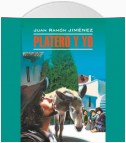Juan Ramon Jimenez

Juan Ramón Jiménez Mantecón (23 December 1881 – 29 May 1958) was a Spanish poet, a prolific writer who received the Nobel Prize in Literature in 1956. One of Jiménez's most important contributions to modern poetry was his advocacy of the French concept of "pure poetry."
Juan Ramón Jiménez was born in Moguer, near Huelva, in Andalucia, on 23 December 1881. He studied law at the University of Seville, but he declined to put this training to use. He published his first two books at the age of eighteen, in 1900. The death of his father the same year devastated him, and a resulting depression led to his being sent first to France, where he had an affair with his doctor's wife, and then to a sanatorium in Madrid staffed by novitiate nuns, where he lived from 1901 to 1903. In 1911 and 1912, he wrote many erotic poems depicting romps with numerous females in numerous locales. Some of them alluded to sex with novitiates who were nurses. Eventually, apparently, their mother superior discovered the activity and expelled him, although it will probably never be known for certain whether the depictions of sex with novitiates were truth or fantasy.
The main subjects of many of his other poems were music and color, which, at times, he compared to love or lust.
He celebrated his home region in his prose poem about a writer and his donkey called Platero y Yo (1914). In 1916 he and Spanish-born writer and poet Zenobia Camprubí were married in the United States. Zenobia became his indispensable companion and collaborator.
 čeština
čeština Deutsch
Deutsch français
français magyar
magyar polski
polski русский
русский English
English Azərbaycan
Azərbaycan беларуская
беларуская italiano
italiano ქართული
ქართული қазақ
қазақ Nederlands
Nederlands português
português slovenčina
slovenčina 中文
中文 español
español








